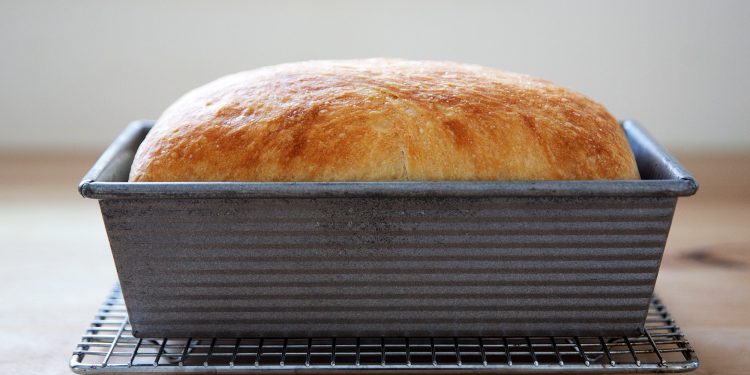Maybe it’s the wintry weather, but lately I’ve been craving easy bread-baking projects, even though any recipe involving yeast tends to scare me. The exception to this rule is basically any recipe from Ali Stafford of Alexandra Cooks, whose simple, clear instructions demystify the from-scratch process in a deeply motivating way — check out her bowl bread if you don’t believe me.
Below is a version of that recipe that you can make in a regular old loaf pan. The bread is remarkable in many ways, but my favorite thing is that you can decide mid-afternoon that you want to bake bread and sit down to a warm, fresh loaf by dinnertime. “People think you need to spend days making bread to get a good crumb structure and flavor and all that,” says Ali. “But you can make very good loaf start to finish in three to four hours.” Sold.

Peasant Bread Sandwich Loaf
Makes 1 loaf
“My mother’s peasant bread continues to be my favorite, easiest bread to make. This is a simple variation, adapted to yield one standard-sized loaf pan, a great shape for both sandwiches and toast. (You can find notes below the recipe that address using whole wheat flour, doubling the recipe, and storing the bread.) For best results, measure with a scale. It will leave you with a delicious loaf of bread, golden-crusted, soft-crumbed, perfect for smearing with good, salted butter.”
3 cups (384 g) bread flour or all-purpose flour
1 1/2 teaspoons (5 g) instant yeast, see notes if using active dry
1 1/2 teaspoons (7 g) sugar
1 1/2 teaspoons (5 g) kosher salt
1 1/2 cups (340 grams) lukewarm water
Softened butter
1 tablespoon olive oil
In a large bowl, whisk together the flour, yeast, sugar and salt. Add the lukewarm water. Using a spatula, stir to combine until you have a sticky dough ball. Cover the bowl with a tea towel and place in a warm spot to rise until the dough doubles, about 2 hours (or longer depending on the temperature of your kitchen).
Heat the oven to 375F. Grease a 9×5-inch or 8.5×4.5-inch loaf pan with the softened butter. Deflate the dough using two forks or a flexible dough scraper. Pour the 1 tablespoon of olive oil over the dough and turn the dough ball to coat it in the oil. Transfer the dough to the prepared pan. Let rise until the dough crowns the rim of the pan, about 45 minutes to an hour.
Transfer the pan to the oven and bake for 45 minutes. Turn the dough out onto a cooling rack and let cool for 30 minutes before slicing.

A few notes from Ali:
Dry-Active Yeast
If using active-dry yeast, sprinkle it over the lukewarm water and add the sugar. Let stand for 15-20 minutes or until the yeast gets foamy. Then proceed with the recipe.
Using Whole Wheat
You can substitute some whole wheat flour for the bread flour, if you wish. I recommend starting small: 1 cup (128 g) whole wheat flour and 2 cups (256 g) bread flour. Keep in mind the more whole wheat flour you add, the heavier/denser the bread will be.
Hydration Issues
Depending on where you live, you may need to adjust the amount of water you are using. This is a very high hydration dough, and if you live in a humid environment or if you are using a different type of flour (as opposed to commercial, American flour such as King Arthur Flour), you may need to reduce the amount of water — the dough should be wet and sticky, but it should still form a ball. In other words, it should not be soupy.
Doubling
Recipe doubles well, if you prefer to make two loaves.
Freezing & Storing
Bread freezes well. Let cool completely; then transfer to an airtight bag or vessel for as long as 3 months. To store the bread, let it cool completely; then transfer to an airtight bag or vessel and leave it at room temperature. Always reheat day-old bread (in the oven or toaster) to revive the crust and crumb.

Source by cupofjo.com

